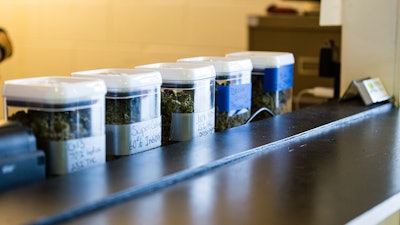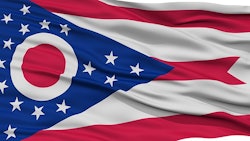
Rhode Island joined neighboring Massachusetts and beat next-door Connecticut to the punch with the launch of adult-use cannabis sales Thursday morning, officially becoming the 16th state to expand commercial access to those 21 and older.
Five existing compassion centers were given approval from the state’s Office of Cannabis Regulation (OCR) to commence adult-use sales Dec. 1 with hybrid retail licenses:
- Aura of Rhode Island (Central Falls)
- Thomas C. Slater Center (Providence)
- Mother Earth Wellness (Pawtucket)
- Greenleaf Compassionate Care Center (Portsmouth)
- RISE Warwick (Warwick)
Mother Earth was the first to open its doors with a 5 a.m. start in Pawtucket, and Karen Ballou, who owns Cultivating RI, a licensed cultivator, was the dispensary’s first adult-use customer, WPRI reported.
“It’s very exciting; it’s been a long time coming,” Ballou told the news outlet about taking part in the first adult-use sale in the state. “It’s been a long six, six and a half years for me to get to this point, for all of us to get to this point, so it was important to be the first sale.”
While Rhode Island became the 16th state to launch a commercial adult-use retail program, it was the 19th state to legalize adult-use cannabis in the U.S. when Gov. Dan McKee signed the Rhode Island Cannabis Act on May 25, 2022. The legislation allows adults 21 and older to purchase up to 1 ounce of cannabis at a time and keep no more than 10 ounces for personal use at a primary residence. In addition, the legislation legalized the home cultivation of up to six plants (three mature).
The roughly six-month turnaround from legalization to sales represents one of the fastest adult-use rollouts in the nation. Arizona, which legalized adult-use cannabis in the November 2020 election, launched sales less than three months later (Jan. 22, 2021).
“This milestone is the result of a carefully executed process to ensure that our state’s entry into this emerging market was done in a safe, controlled and equitable manner,” McKee said in a Nov. 22 announcement confirming the Dec. 1 launch date for Rhode Island.
One of the keys to rolling out an adult-use cannabis program is ensuring there’s adequate supply to meet demand, notably to safeguard access for medical cannabis patients. States with more established medical programs are usually better equipped to meet supply standards for an expanded market more quickly. Rhode Island’s existing cannabis supply chain includes nearly 70 licensed cultivators, processors and manufactures to serve the medical and adult-use marketplaces.
Adult-use program rollouts also depend upon properly staffed regulatory bodies.
Matt Santacroce, the interim deputy director of the state’s Department of Business Regulation, which the OCR operates under, told NBC 10 News that the state’s oversight arm for the cannabis industry has the resources it needs.
“Absolutely we do,” he said, adding that his department recently hired four new staffers and plans to hire roughly a dozen more to triple the state’s cannabis inspection ability.
Under the Rhode Island Cannabis Act, existing medical operators can transition to the new marketplace with hybrid licenses, while another 24 adult-use retail licenses will be distributed equally among six geographic zones in the state. One retail license in each zone will be reserved for a social equity applicant and another in each zone for a workers’ cooperative applicant.
But those new operators must be approved by a state cannabis commission, which has not been set up yet. McKee has the power to nominate the commissioners.
In the interim, Santacroce offered some wisdom for those seeking to enter the space: It’s not a get-rich-fast industry.
“To the extent that people think that, or used to think that this is like a gold mine that just has to be tapped and everybody is going to get rich immediately, you know, it’s a hard industry,” he told NBC 10 News.
While operators in more mature markets—like California, Colorado, Oregon and Washington—are struggling amidst price compression and unsustainable taxes, including a 37% excise tax in Washington, Rhode Island’s adult-use cannabis tax structure includes the state’s standard 7% sales and use tax, as well as a new 10% state cannabis excise tax and a 3% local cannabis excise tax, according to state’s Department of Revenue.
The state and local cannabis excise taxes do not apply to the sale of cannabis products by a treatment center to qualifying medical cannabis patients.
The Department of Revenue anticipates roughly $10 million in tax revenue to be generated from adult-use cannabis sales in the first full year of Rhode Island’s program.


























